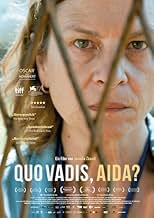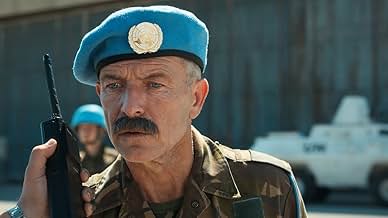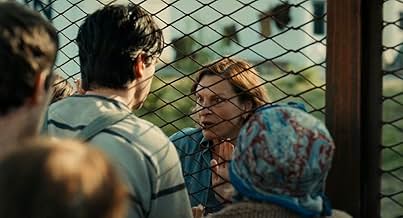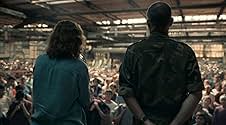IMDb RATING
8.0/10
41K
YOUR RATING
Aida is a translator for the UN in the small town of Srebrenica. When the Serbian army takes over the town, her family is among the thousands of citizens looking for shelter in the UN camp.Aida is a translator for the UN in the small town of Srebrenica. When the Serbian army takes over the town, her family is among the thousands of citizens looking for shelter in the UN camp.Aida is a translator for the UN in the small town of Srebrenica. When the Serbian army takes over the town, her family is among the thousands of citizens looking for shelter in the UN camp.
- Director
- Writers
- Stars
- Nominated for 1 Oscar
- 40 wins & 42 nominations total
- Director
- Writers
- All cast & crew
- Production, box office & more at IMDbPro
Summary
Reviewers say 'Quo Vadis, Aida?' is a powerful, harrowing film about the Srebrenica massacre, praised for impactful storytelling and strong performances, especially Jasna Duricic as Aida. It critically examines the United Nations' failure and explores themes of war and survival. While lauded for emotional depth and historical significance, some criticize perceived inaccuracies and over-dramatization. It is considered an important, though challenging, film that highlights a significant historical event.
Featured reviews
The film covers the topic on Srebrenica genocide, which was committed in 1995 in Bosnia. It is portrayed through a family story, with Aida, a translator for the UN, as the main character.
A sad, but an important lecture on what hatred can make people do.
This is about events around the Srebrenica massacre in 1995. The UN promised that this would be a safe zone, but doesn't back up its ultimatums with action, leaving the small contingent of UN peacekeepers helpless in the face of stronger Serbian forces, who step-by-step get bolder, take over the town, and eventually the civilians seeking safety at the UN base.
I saw this as a digital screening of the Toronto International Film Festival, with writer / director Q+A. The writer put together the story based on actual transcripts, together with survivor stories. Many were composited into the main character Aida. Aida is a translator for the UN troops, and she also tries to keep safe her husband and 2 teenaged sons,. Thus she could move between the "defenders" and the defended, and tell the stories of both.
The characters are well-played and believable, and there are little touches that are illuminating: some flashbacks to pre-war life, a reference to neighbors turning against neighbors, etc. My one complaint is that, as a composite, some events seem to happen too quickly.
I saw this as a digital screening of the Toronto International Film Festival, with writer / director Q+A. The writer put together the story based on actual transcripts, together with survivor stories. Many were composited into the main character Aida. Aida is a translator for the UN troops, and she also tries to keep safe her husband and 2 teenaged sons,. Thus she could move between the "defenders" and the defended, and tell the stories of both.
The characters are well-played and believable, and there are little touches that are illuminating: some flashbacks to pre-war life, a reference to neighbors turning against neighbors, etc. My one complaint is that, as a composite, some events seem to happen too quickly.
So horrible so horrible...
A war movie about the Srebrenica massacre in 1995. A mother, who's also an interpreter, tried to get her family to safety while the civilians were being transported by the Serbian force.
Coming in, I didn't know anything about the real life story. However, after watching about 10 to 15 minutes, it was abundantly clear what was going to happen. For the rest of the movie, it became a desperate, maddening, and heartbreaking descend into the inevitable. This was shown through the lens of our main character, and her desperation was relatable, like if you were in her shoes you would do everything she did.
The color and cinematography also heightened the desperation. The movie looked monotonous. The overwhelming color of the ground during the day felt hot, dry, and reflected the dire situation the civilians were in. Even more, the movie felt so raw, making me feel like I'm actually there with the people.
And then the ending hit. I knew it was coming, but still I was in silence as the camera slowly moved away. There's no need for showing actual violence. Just the sound was enough to convey the horror. The last scene was a strong testament of the director about the unjust event.
Overall, a devastating movie that i would not want to see again. 9/10.
A war movie about the Srebrenica massacre in 1995. A mother, who's also an interpreter, tried to get her family to safety while the civilians were being transported by the Serbian force.
Coming in, I didn't know anything about the real life story. However, after watching about 10 to 15 minutes, it was abundantly clear what was going to happen. For the rest of the movie, it became a desperate, maddening, and heartbreaking descend into the inevitable. This was shown through the lens of our main character, and her desperation was relatable, like if you were in her shoes you would do everything she did.
The color and cinematography also heightened the desperation. The movie looked monotonous. The overwhelming color of the ground during the day felt hot, dry, and reflected the dire situation the civilians were in. Even more, the movie felt so raw, making me feel like I'm actually there with the people.
And then the ending hit. I knew it was coming, but still I was in silence as the camera slowly moved away. There's no need for showing actual violence. Just the sound was enough to convey the horror. The last scene was a strong testament of the director about the unjust event.
Overall, a devastating movie that i would not want to see again. 9/10.
I am a guy from Serbia and I gave this movie 10/10 because it has really good script and it is true work of art. I wish directors from Serbia would make more films which are as good as this one.
*Why this film*- This was nominated for the 2021 Best Foreign Film Academy Award, which it lost to Another Round.
Also, I am reading America and the Problem of Hell - an account of genocides of the 20th century. The last genocide that the book extensively talks about, is of the Bosnian Muslims by the Serbians, at Srebrenica. This is set smack in the middle of that tumultuous time.
*What I liked about it* - The pacing and the scripting. It is 100 minute long and packs so much in that century. The chief protagonist, Aida, a UN translator, might be the one of the most true flesh-and-blood characters written for screen. Her personal and professional battles form the crux. The UN soldiers, tasked with enforcing truce between the Bosnians and the Serbs and the Serbian warlords, intent on capturing the city and relocating its citizens are vividly drawn. The acting is so natural that you feel at times that you are watching a documentary, rather than a thriller.
It reminded me of our very own _The Kashmir Files_ at times. The terror that you are being hunted just for your religious identity, is as real here, as it was there. The brutality, much of it off screen here, would make your fertile imagination churn up many scenarios. It is telling that this was sent to the Academy Award by the country whereas The Kashmir Files was reviled by a section of the intelligentsia and political class as conjecture and not fact based.
This is a great film and is surely going to be seared in the memories of those who choose to watch it.
Also, I am reading America and the Problem of Hell - an account of genocides of the 20th century. The last genocide that the book extensively talks about, is of the Bosnian Muslims by the Serbians, at Srebrenica. This is set smack in the middle of that tumultuous time.
*What I liked about it* - The pacing and the scripting. It is 100 minute long and packs so much in that century. The chief protagonist, Aida, a UN translator, might be the one of the most true flesh-and-blood characters written for screen. Her personal and professional battles form the crux. The UN soldiers, tasked with enforcing truce between the Bosnians and the Serbs and the Serbian warlords, intent on capturing the city and relocating its citizens are vividly drawn. The acting is so natural that you feel at times that you are watching a documentary, rather than a thriller.
It reminded me of our very own _The Kashmir Files_ at times. The terror that you are being hunted just for your religious identity, is as real here, as it was there. The brutality, much of it off screen here, would make your fertile imagination churn up many scenarios. It is telling that this was sent to the Academy Award by the country whereas The Kashmir Files was reviled by a section of the intelligentsia and political class as conjecture and not fact based.
This is a great film and is surely going to be seared in the memories of those who choose to watch it.
Did you know
- TriviaJasna Djuricic, who plays the main role, is the wife of Boris Isakovic, who plays general Mladic. They often work together in film and theater, but in this film they don't share any scenes.
- Quotes
Aida Selmanagic: We are on the list!
- ConnectionsFeatured in La 93e cérémonie des Oscars (2021)
Details
- Release date
- Countries of origin
- Official sites
- Languages
- Also known as
- Quo Vadis, Aida?
- Filming locations
- Production companies
- See more company credits at IMDbPro
Box office
- Budget
- €4,500,000 (estimated)
- Gross worldwide
- $813,253
- Runtime
- 1h 41m(101 min)
- Color
- Sound mix
- Aspect ratio
- 1.85 : 1
Contribute to this page
Suggest an edit or add missing content


![Trailer [OV]](https://m.media-amazon.com/images/M/MV5BNjFiN2EzNDItMzBiNy00YjI4LTkwM2YtN2YxYzcwYmYzYjIxXkEyXkFqcGdeQXRyYW5zY29kZS13b3JrZmxvdw@@._V1_QL75_UX500_CR0)




































